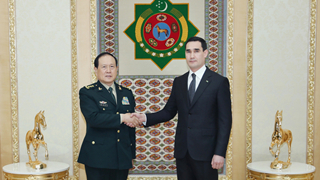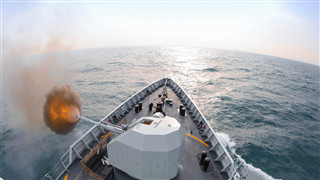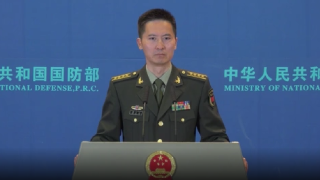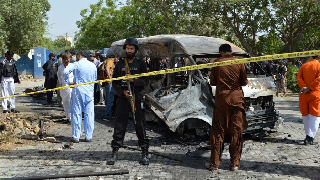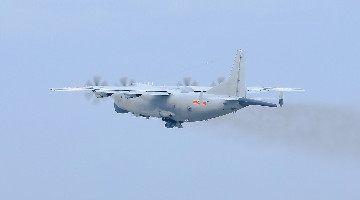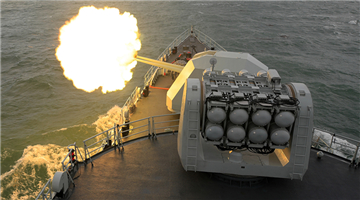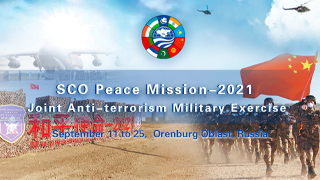The Ukraine situation and the geopolitical tragedy it has triggered don't seem to be able to satiate certain US-led western countries'appetite for political gains out of this crisis. Japanese Prime Minister Fumio Kishida, who was visiting Britain, reached an agreement with his British counterpart Boris Johnson on the "reciprocal access" for the JSDF and British armed forces, which Johnson said was a "landmark" that will boost the UK's commitment to the Indo-Pacific. Kishida made the scare-mongering remark that "what happens to Ukraine today may happen to East Asia tomorrow", adding that “now is the time for the Group of Seven to consolidate our solidarity".
乌克兰局势及其引发的地缘政治悲剧,并不足以填满美西方一些国家从中捞取政治利益的胃口。正在英国访问的日本首相岸田文雄5日与英国首相约翰逊达成原则性共识,让日本自卫队与英军实现“相互准入”。约翰逊称此举 “具有里程碑意义”,将加强“英国对印太地区的承诺”。岸田文雄则耸人听闻地宣称“今日乌克兰或是明日东亚”,并表示“现在是七国集团巩固其团结的时候了”。
These fancy talks implied a dangerous tendency: NATO, which is dividing Europe and fomenting crisis and war around the world, is trying to transplant its playbook of "group politics" and "bloc confrontation" to Asia Pacific. For quite some time now, Britain has been drumming about an "Asian-Pacific NATO" on several occasions and calling upon countries to respond to the "Indo-Pacific threats" and "help Taiwan defend itself". Japan, a country in the Asian-Pacific region, is excitedly echoing with this move, seeming quite interested to lead the way for NATO to extend its claws to the region.
这些听起来花里胡哨的言辞,显示出一个危险动向:在欧洲制造分裂、在世界制造危机和战争的北约组织,正企图将“集团政治”“阵营对抗”那一套复制到亚太地区。一段时间以来,英国已经在多个场合高调推动“北约亚太化”,呼吁应对“印太威胁”,“帮助台湾自卫”。在亚太内部,日本正在异常起劲地应和这种盘算,似乎一心想成为“北约亚太化”的带路党。
The main force driving this countercurrent is without any doubt the US. Washington has been urging or forcing its allies to act in line with its shift of strategic focus to the east in recent years, and those countries are willing to act as America's lackeys while making their own calculations. London hopes to augment its declining influence by "finding the path" for Washington, while Japan dreams of shattering the "restrictions" imposed by its Constitution of Peace and reviving militarism leveraging on "Big Brother's" appeasement and indulgence. In sum, the Ukraine crisis is a bonanza in the eyes of some western politicians, who therefore will definitely keep escalating regional tension in order to maximize their interests out of the crisis.
推动这股逆流的主力无疑是美国。华盛顿近年来不断推动盟友配合其战略重心东移,一些国家甘愿为美国这一战略调整牵马坠镫,同时各打各的算盘。伦敦希望借助帮华盛顿“探路”来扩大自身原本已经衰落的影响力,而日本则想借美国的姑息纵容摆脱和平宪法的“束缚”、为军国主义“叫魂”。总之,乌克兰危机是一些西方政客眼里的一盘“好菜”,为此他们势必不断升级制造地区紧张的调门和动作。
Japan's unusual excitement about the Russia-Ukraine conflict is worth special attention. Its prime minister, foreign minister and defense minister all set out and made a series of diplomatic moves in neighboring countries, Europe and the US. Although the Asian countries they visited didn't share their excitement and kept generally cautious and vigilant, Tokyo found resonance and warmth of friendship in London, which is dreaming of becoming Asia's suzerain again by ganging up with like-minded countries. What an uncanny coincidence to the Anglo-Japanese Alliance at the beginning of the 20th century!
尤其值得注意的是,日本在俄乌冲突后格外兴奋。近期日本包括首相、外务大臣及防卫大臣在内的高层“三相齐出”,在周边及欧美展开一系列外交动作。然而其到访的亚洲国家对此普遍保持了警惕,没有与之唱和,直到抵达同样幻想着借助抱团重现亚洲“宗主国”旧梦的伦敦,东京才算找到一点共同语言和“朋友的温暖”。在外界看来,这很难不让人想到上个世纪初的“日英联盟”。
Countries in East Asia, or the entire Asia for that matter, have maintained overall stability in the past decades primarily because they can seek common ground while shelving differences beyond ideological and geopolitical divergences. That's why Asia has become the most vibrant region in the world today and the "Asian century" has been a lasting topic of hot debate in the international academia on strategies.
东亚乃至整个亚洲地区国家在过去几十年里之所以能保持整体平稳的局面,是因为地区国家能求同存异,超越意识形态和地缘政治分歧,使亚洲地区成为如今世界上最具活力的地区,使“亚洲世纪”成为国际战略界争相讨论的持久话题。
Now, certain country in the region is trying to collude with the US-led West and introduce to Asia Pacific the security mode that has proven a failure and caused serious consequences in Europe. Why is it trying to sabotage regional peace and stability? The collapse of European security is solid proof that the US-led NATO – its system and its approaches –no longer suits the world today. While some country, being solely obsessed with their own interests, is moaning that "what happens to Ukraine today may happen to East Asia tomorrow", it is seriously thinking about reproducing the Ukraine crisis in other places around the world. All Asian countries must be highly vigilant against this tendency.
如今,有人想与美西方“里应外合”,将已经在欧洲证明失败并引发严重后果的“安全模式”强行引入亚太,这岂不正是要破坏地区和平稳定吗?欧洲安全出现“死机”,恰恰说明以美国为首的北约这套系统已经不再适应今天的时代。而那些嘴上天天挂着“今日乌克兰或是明日东亚”的国家,被一己私利冲昏了头,其内心在其他地区复制一个甚至多个乌克兰危机的盘算是认真的,亚洲各国对此必须予以高度重视。
History has repeatedly shown us that security for different countries is indivisible, that no country shall guarantee its own security at the expense of that of other countries. NATO's mode of operation that features bloc confrontation divides regional countries into two groups – either a NATO member or a non-member, which will only create a stronger sense of insecurity and drag everyone into the security paradox and dilemma where they constantly escalate the alarm and hostility toward each other. NATO, a military bloc, is by no means the antidote to alleviate the security anxiety and tension among regional countries – it is the poison itself. We should not let the "new Cold War" ruin the peace and stability in Asia, and all countries in the region must forge a consensus and awareness of resisting and rejecting an "Asian Pacific NATO".
历史经验反复表明,各国安全不可分割,一国安全不能建立在牺牲他国安全基础之上。北约式的集团对抗机制将地区国家强行划分为联盟内国家和联盟外国家,这只能制造更大的不安全,让各国陷入到相互拉升警报和敌意的安全悖论、安全困境陷阱当中。要缓解地区国家的安全焦虑和紧张,作为军事联盟的北约绝对是一剂毒药而非解药。亚洲的良好局面决不能被“新冷战”毁了,警惕、拒绝“北约亚太化”应成为地区各国的强大共识和集体意识。
We also need to remind Japan not to undermine the regional environment for peaceful development by ushering a wolf into the house. That will bring a disaster to itself and its Asian neighbors. History has taught us a good lesson on that point.
我们还要特别强调,日本不要破坏地区和平发展的大环境,“引狼入室”的做法害人害己,历史的教训也不可谓不深刻。
Editor's note: This article is originally published on huanqiu.com, and is translated from Chinese into English and edited by the China Military Online. The information, ideas or opinions appearing in this article do not necessarily reflect the views of eng.chinamil.com.cn.

